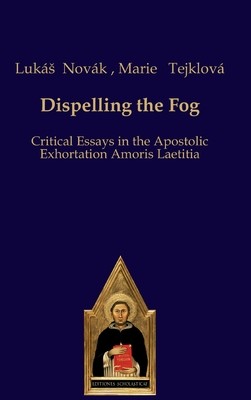
- We will send in 10–14 business days.
- Publisher: Verlag Editiones Scholasticae
- Year: 2022
- Pages: 202
- ISBN-10: 3868385991
- ISBN-13: 9783868385991
- Format: 15.2 x 22.9 x 1.6 cm, hardcover
- Language: English
- SAVE -10% with code: EXTRA
Dispelling the Fog (e-book) (used book) | bookbook.eu
Reviews
Description
2021 was the fifth anniversary of Amoris Lætitia, and according to pope Francis, it should have been a year of reflection on the exhortation, an opportunity to focus more closely on the content of the document. In response to this appeal, Dispelling the Fog presents five essays analysing the issue of the so-called "divorced-remarried" and their access to the Eucharist in connection with the exhortation. Vojtěch Simek focuses on the crucial Chapter 8 of Amoris Lætitia and its possible interpretations. Peter Dvořák examines and refutes the claim that the teaching of the exhortation is Thomistic. Lukás Novák argues that even after Amoris Lætitia, there is no sustainable argument to vindicate the legitimacy of administering the Eucharist to the "remarried" who refuse to commit themselves to abstinence. Stanislav Přibyl interprets the ever increasing demand for unrestricted access to the Eucharist as a manifestation of a general tendency in the post-conciliar Church to abandon the Sacrament of Penance. Finally, Marie Tejklová criticizes the so-called Filial Correction for not adequately addressing the symptoms of modernism in Amoris Lætitia: given that modernism is based on skepticism, it cannot be countered by a mere appeal to the teaching of the Church but calls for a philosophical refutation. The book further includes a foreword by bishop Athanasius Schneider, an afterword by Professor Stanislav SousedÃk and rich indices.
EXTRA 10 % discount with code: EXTRA
The promotion ends in 16d.03:01:04
The discount code is valid when purchasing from 10 €. Discounts do not stack.
- Publisher: Verlag Editiones Scholasticae
- Year: 2022
- Pages: 202
- ISBN-10: 3868385991
- ISBN-13: 9783868385991
- Format: 15.2 x 22.9 x 1.6 cm, hardcover
- Language: English English
2021 was the fifth anniversary of Amoris Lætitia, and according to pope Francis, it should have been a year of reflection on the exhortation, an opportunity to focus more closely on the content of the document. In response to this appeal, Dispelling the Fog presents five essays analysing the issue of the so-called "divorced-remarried" and their access to the Eucharist in connection with the exhortation. Vojtěch Simek focuses on the crucial Chapter 8 of Amoris Lætitia and its possible interpretations. Peter Dvořák examines and refutes the claim that the teaching of the exhortation is Thomistic. Lukás Novák argues that even after Amoris Lætitia, there is no sustainable argument to vindicate the legitimacy of administering the Eucharist to the "remarried" who refuse to commit themselves to abstinence. Stanislav Přibyl interprets the ever increasing demand for unrestricted access to the Eucharist as a manifestation of a general tendency in the post-conciliar Church to abandon the Sacrament of Penance. Finally, Marie Tejklová criticizes the so-called Filial Correction for not adequately addressing the symptoms of modernism in Amoris Lætitia: given that modernism is based on skepticism, it cannot be countered by a mere appeal to the teaching of the Church but calls for a philosophical refutation. The book further includes a foreword by bishop Athanasius Schneider, an afterword by Professor Stanislav SousedÃk and rich indices.


Reviews